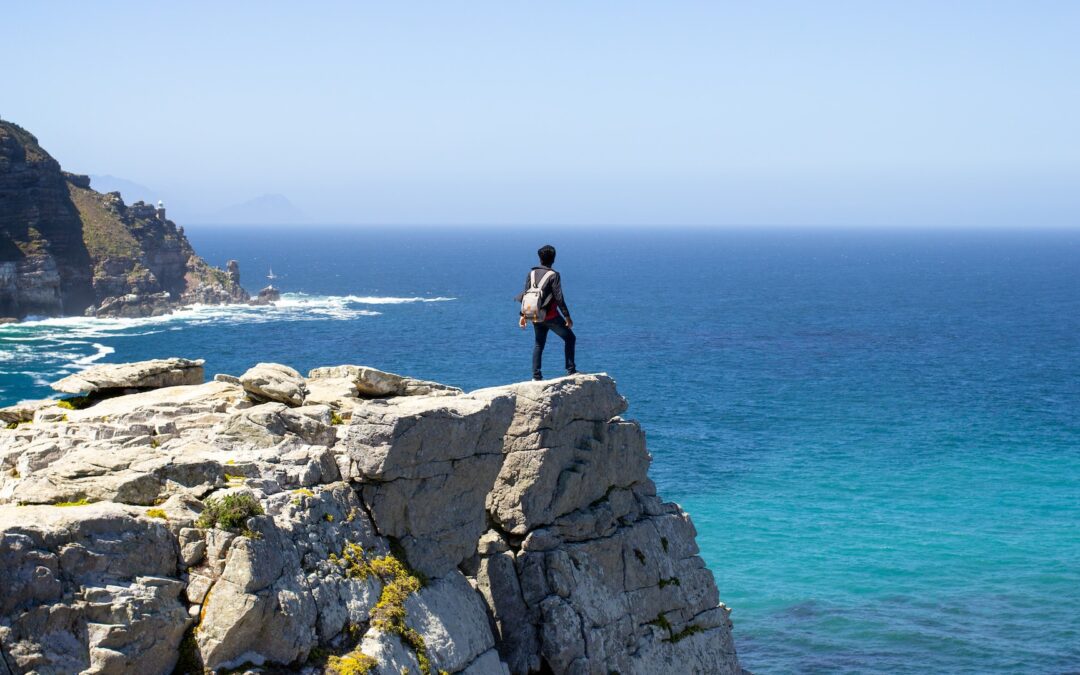|
|
We got very excited when South Africa announced that it would be introducing a digital nomad visa as part of the State of the Nation address in February 2022. We were told that the visa would be available by the end of 2023, but the government has now officially announced that it will miss that deadline. This is apparently down to a failure to amend the Immigration Act to account for remote workers.
There is no denying that Africa is behind the curve when it comes to offering digital nomad visas, which are now common in Europe, Southeast Asia, and South America, and the Middle East to attract remote workers.
So, what are the options for digital nomads keen to travel to Africa?
Africa’s most popular digital nomad destinations
A recent Resume.IO report has provided a list of countries attracting the most digital nomads on the basis of social media posts using digital nomad-related hashtags. While it may not be the most scientific approach, it has revealed where digital nomads are heading in Africa.
- Morocco – 22,411 in the last year
- South Africa – 20,402 in the last year
- Egypt – 12,674 in the last year
- Mauritius – 6,801 in the last year
- Tanzania – 4,482 in the last year
- Kenya – 4,328 in the last year
- Namibia – 3,091 in the last year
Interestingly, many of these countries do not offer digital nomad visas, and some countries that do offer visas have not made their way onto the list. Let’s take a closer look.
South Africa

While Morocco is first on the list, South Africa stands out as the most popular destination in Africa for digital nomads, with around 10,000 living in Cape Town. It helps that English is widely spoken in the country.
South Africa announced that it would be launching a digital nomad visa for up to 12 months, with an estimated income requirement of $3,000 per month. But it is now uncertain when this promise will become a reality.
For the time being, the best way for most digital nomads to travel to South Africa is on a tourist visa, which allows you to stay in the country for up to 90 days. South Africa also has a retirement visa for retirees with a monthly income of at least $2,000 per month.
For those interested in exploring Africa’s vibrant landscapes and cultures, South Africa group tours are excellent opportunities to experience the country’s diversity while awaiting the launch of the digital nomad visa.
- Cost of Living: $539 single person without accommodation
- Language: English, Afrikaans, Xhosa, Zulu
- Currency: South African Rand 1 ZAP = USD0.054
- Major Cities: Johannesburg, Cape Town, Soweto
Pros of South Africa for Digital Nomads:
South Africa is a beautiful and diverse country with stunning beaches, epic mountain ranges, and unforgettable safari opportunities. It is a diverse nation where English is widely spoken, making it relatively easy for foreigners to settle in, at least in the bigger cities. On top of this, it has an affordable cost of living, estimated to be around 55% less than in the United States.
Cons of South Africa for Digital Nomads:
On the negative side, South Africa can be a relatively dangerous country and it is important to take security measures. While Wi-Fi infrastructure is good, blackouts to relieve stress on the energy network are also common, and no power, no Wi-Fi.
Morocco
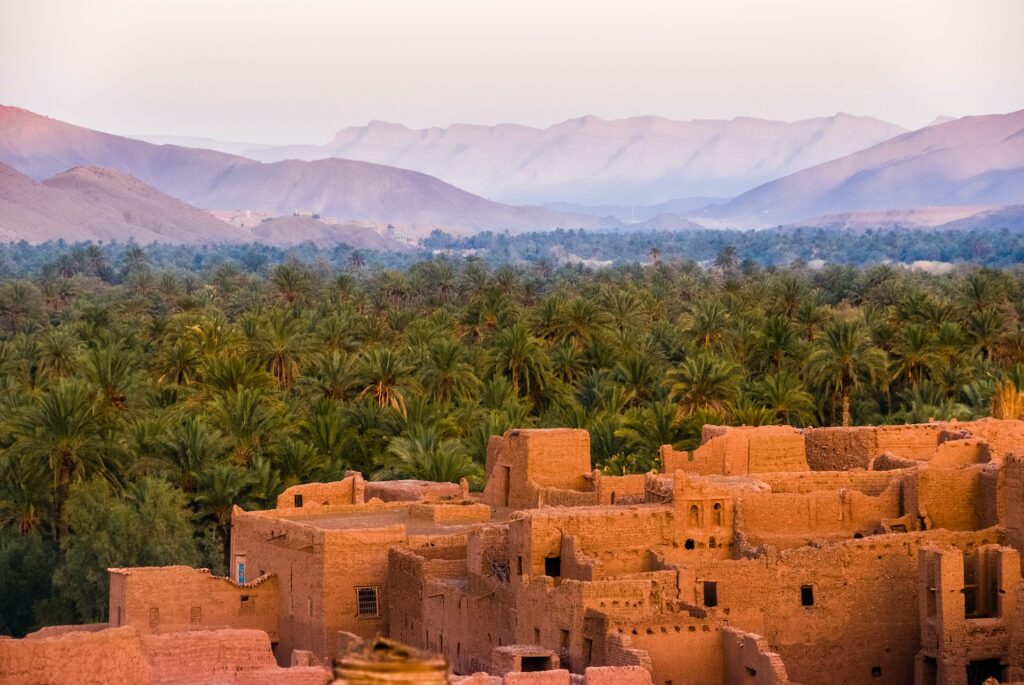
Morocco is another very popular African destination for digital nomads, despite not having a digital nomad visa. The best way to travel to Morocco is on a tourist visa, which is for 90 days, but the fine for overstaying is fairly low.
- Cost of Living: $425 single person without accommodation
- Language: Arabic, Berber
- Currency: Moroccan Dirham 1 MAD = USD0.097
- Major Cities: Marrakesh, Fes, Rabat
Pros of Morocco for Digital Nomads:
Morocco is another scenic and beautiful country with spectacular coastlines and fascinating cities. Expect traditional Muslim architecture and incredible sooks. The cost of living in the country is also very reasonable, estimated to be more than 70% less than in the United States.
Cons of Morocco for Digital Nomads:
But Morocco is famously a place where it is difficult to get things done because of all the bureaucracy. It can also be hard for foreigners to feel at home due to cultural and language barriers. Crime can also be a problem, and laws are strict, so you may inadvertently be committing crimes yourself!
Egypt

It should be no surprise that Egypt is a popular destination for digital nomads with its fascinating culture. This is set to increase as tourism recovers following a hit in recent years due to the pandemic and fears around safety. There is currently no digital nomad visa, but you can visit on a 90-day tourist visa, which can be extended for an additional 90 days.
- Cost of Living: $345 single person without accommodation
- Language: Arabic
- Currency: Egyptian Pound 1 EGP = USD0.032
- Major Cities: Cairo, Aswan, Luxor, Alexandria
Pros of Egypt for Digital Nomads:
Egypt is such a fascinating country that it is sure to be inspiring for anyone who chooses to spend time there. The cost of living is also very reasonable, estimated to be about 65% less than in the United States.
Cons of Egypt for Digital Nomads:
Security concerns have not completely disappeared in Egypt, and it can be challenging for travelers to feel safe, especially women. The cities can feel overpopulated and polluted, and driving can be a scary experience!
Tanzania

Tanzania, the gateway to the Serengeti, doesn’t have a digital nomad visa, but there are options for remote workers. The Class C Business Visa is a popular choice. It is granted for 90 days in the first instance but can be extended for up to six months. You only need to provide evidence of business activity and financial stability to qualify for the visa.
- Cost of Living: $465 single person without accommodation
- Language: Swahili, English
- Currency: Tanzanian Shilling 1 TZS = USD0.00040
- Major Cities: Dar es Salaam, Dodoma
Pros of Tanzania for Digital Nomads:
Tanzania is an attractive destination for safaris and to see Africa’s unique landscapes and wildlife, not to mention Mount Kilimanjaro. It is also known for its diverse culture and friendly people that make day-to-day life positive. The cost of living in Tanzania is also highly affordable.
Cons of Tanzania for Digital Nomads:
Internet and transport infrastructure in Tanzania can be touch and go. You can usually get what you want, but it can be expensive. There can also be a language barrier for travelers who don’t speak Swahili.
Kenya

While Kenya is popular with digital nomads, there is no specific visa for remote workers. You can get a three-month single-entry tourist visa, or you can get an East Africa Tourist Visa that lets you travel in Kenya, Rwanda, and Uganda for three months.
- Cost of Living: $430 single person without accommodation
- Language: Swahili, English
- Currency: Kenyan Shilling 1 KES = USD0.0068
- Major Cities: Nairobi, Mombasa
Pros of Kenya for Digital Nomads:
Kenya has moderate temperatures and weather throughout the year, so it is almost always a good time to visit its wildlife reserves and palm-lined beaches. In Nairobi, digital nomads can integrate into the local community relatively easily thanks to a middle-class lifestyle and English being widely spoken.
Cons of Kenta for Digital Nomads:
Personal safety can be a problem, with crimes like carjacking being relatively common. You may have to pay to live in a gated community, and utilities such as electricity and Wi-Fi can also be expensive. Blackouts and water supply disruptions are also common.
Namibia

We might expect to see Namibia moving up this list soon as it has recently launched a digital nomad visa. It is for six months in the first instance, but it is renewable, and you should show a monthly income of around $2,000.
- Cost of Living: $515 single person without accommodation
- Language: English
- Currency: Namibian Dollar 1 NAD = USD0.067
- Major Cities: Windhoek
Pros of Namibia for Digital Nomads:
Namibia is a country of stunning natural beauty including vast deserts, rugged mountains, and incredible wildlife. The cities feel relatively safe and peaceful and English is the official language. The affordable cost of living makes it easy to live well.
Cons of Namibia for Digital Nomads:
Getting around can be a challenge because public transport is disorganized, and once you are outside of the cities, internet coverage is limited. There isn’t a big café and restaurant culture, which can make it difficult for digital nomads to integrate into the community.
Cabo Verde
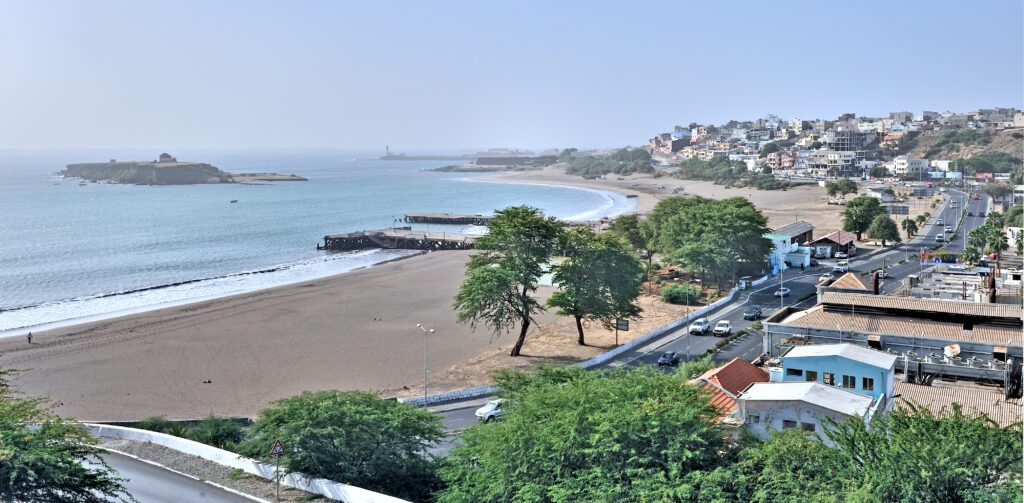
Cabo Verde, or Cabo, is an archipelago located off the west coast of Africa that offers a six-month visa that is open to citizens of Europe, North America, the Community of Portuguese-speaking Countries, and the Economic Community of West African States. You don’t need to prove that you work remotely, only that you have around $1,500 per month to support yourself. The visa is renewable after the first six months.
- Cost of Living: $640 single person without accommodation
- Language: Portuguese
- Currency: Cape Verdean Escudo 1 CVE = USD0.0096
- Major Cities: Praia, Mindelo, Espargos, Assomada
Pros of Cabo Verde for Digital Nomads:
Cabo Verde is idyllic for beach lovers with warm weather and naturally beautiful beaches everywhere. The culture is a unique mix of African and European traditions, so you can expect great food and interesting surprises wherever you go. The cost of living is also affordable, and the country has a commitment to sustainable tourism.
Cons of Cabo Verde for Digital Nomads:
Infrastructure is not as developed as it could be, so transport and Wi-Fi can both be slow. The country is small, so you might feel like you have done everything pretty quickly. Those who love museums and cultural venues will be disappointed.
Mauritius
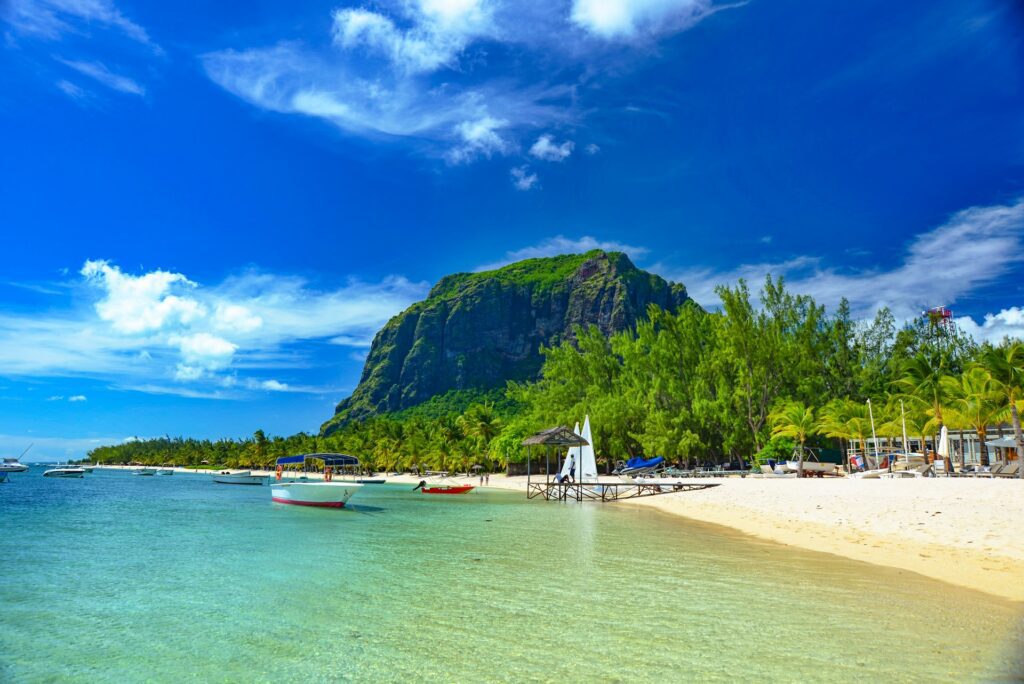
Mauritius, an archipelago nation in the Indian Ocean, is one of the new African nations to have launched a digital nomad visa, which is for one year in the first instance, renewable. You should be able to show that you have a monthly income of at least $1,500 to support yourself.
- Cost of Living: $590 single person without accommodation
- Language: Mauritian Creole, French
- Currency: Mauritian Rupee 1 CVE = USD0.023
- Major Cities: Port Louis, Vacoas, Beau Bassin-Rose Hill
Pros of Mauritius for Digital Nomads:
The fascinating and beautiful African islands certainly attract tourists for the landscape and the weather, but the welcoming local culture is another factor that makes Mauritius so liveable. English and French are widely spoken, and you can get direct flights to the islands from Europe.
Cons of Mauritius for Digital Nomads:
Public transport in Mauritius isn’t good, so getting a car is a good idea, but road conditions and traffic will take some getting used to. The cost of living is higher compared to many of its mainland neighbors due to the cost of transporting goods.
Seychelles
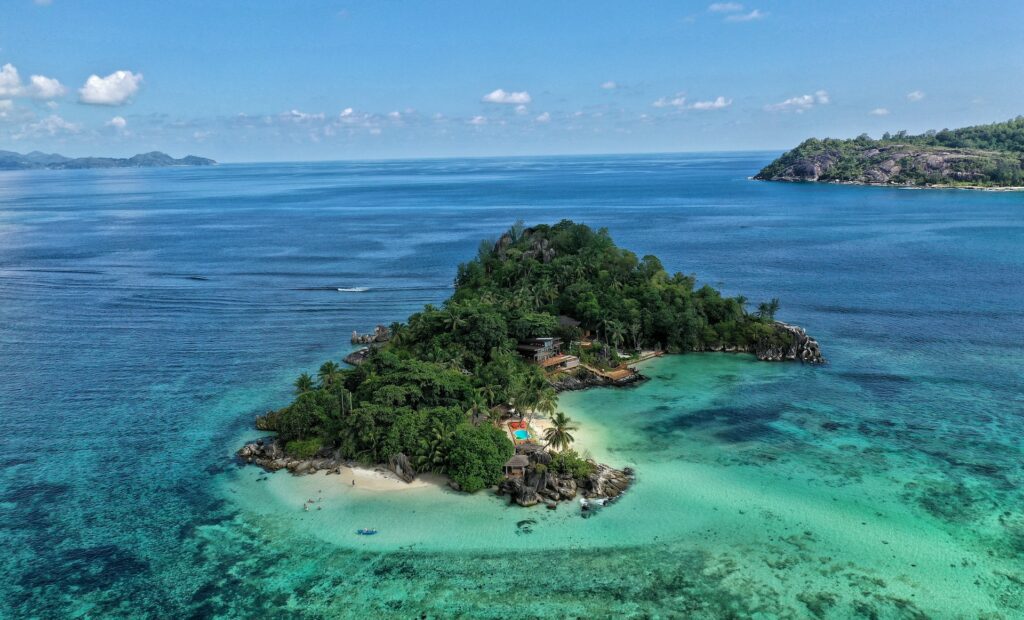
Seychelles is the smallest country in Africa, despite covering 155 islands in the Indian Ocean. Nevertheless, the nation has launched a digital nomad visa to attract remote workers. It is valid for one year, and while there is no minimum income requirement, your financial stability will be assessed as part of your application.
- Cost of Living: $912 single person without accommodation
- Language: French, English, Seychellois Creole
- Currency: Seychellois Rupee 1 CVE = USD0.076
- Major Cities: Anse Boileau, Beau Vallon, Takamaka
Pros of Seychelles for Digital Nomads:
Seychelles is another place where you can expect great weather, beautiful beaches, and a laid-back “island paradise” kind of lifestyle. English is widely spoken. Divers and snorkelers will be very happy with the underwater worlds to discover around the archipelago.
Cons of Seychelles for Digital Nomads:
While the country is small, transport links are not good, so everything feels far. The cost of transport adds to the fact that everything is pretty expensive in Seychelles.
Will you be traveling to Africa?
Africa is slowly opening up to digital nomads, and we can expect to see more and more African nations launching visas to attract remote workers to spend in local economies. The above countries are leading the charge, but there will surely be more to add to the list soon.

